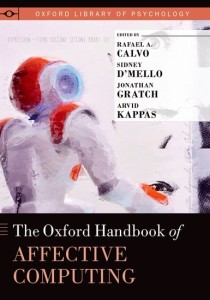My article on “Affect and Machines in the Media” was just published in The Oxford Handbook of Affective Computing, edited by Rafael A. Calvo, Sidney D’Mello, Jonathan Gratch, and Arvid Kappas.
This essay discusses major cultural fantasies and preconceptions about machines and emotion, as these have been formed in science fiction literature, film, and popular culture. Whether or not robots are becoming more possible or available in actuality, they have been active and powerful in our fictions and in our collective imagination. Students and researchers in the field of affective computing need to be alert to this existing heritage and all its assumptions–both in order to understand their end users and their expectations of an affective computing application, and in order to catch and interpret their own biases or tendencies.
One of the questions that I raise in this piece is about the levels of emotional responsivity we expect or desire from mechanical applications. After all, human culture has many levels and types of emotional register, from warmth, cheerfulness or friendliness, to formality, distance, or professionalism. While science fiction texts sometimes make fun of over-emotional robots, in practice we have many choices about what kind of response would be appropriate or desirable in any given situation. This versatility is both complex, hard to program and hard to imitate, and necessary for effective affective applications.
Click here to download and read my essay:
Citation: “Affect and Machines in the Media.” Edited by Rafael Calvo, Sidney D’Mello, Jonathan Gratch, and Arvid Kappas. In The Oxford Handbook of Affective Computing.
What is affective computing?
Here is how the book’s editors describe the concept of affective computing:
Affective Computing is a growing multidisciplinary field encompassing computer science, engineering, psychology, education, neuroscience, and many other disciplines. It explores how affective factors influence interactions between humans and technology, how affect sensing and affect generation techniques can inform our understanding of human affect, and on the design, implementation, and evaluation of systems that intricately involve affect at their core.
From affect recognition, to machine learning, game design, educational applications, and robotics research, the field of affective computing fosters an interdisciplinary approach to understanding human emotion, and to designing mechanical and computing applications that allow for better communication between machines and users.
Want to learn more?
- Here is the Affective Computing team at the MIT Media Lab, and some of the projects they are working on.
- Emotionally effective interfaces at the University of Cambridge Computer Laboratory.
- And an article in the New Yorker about computer scientist Rana el Kaliouby and her company, Affectiva.
